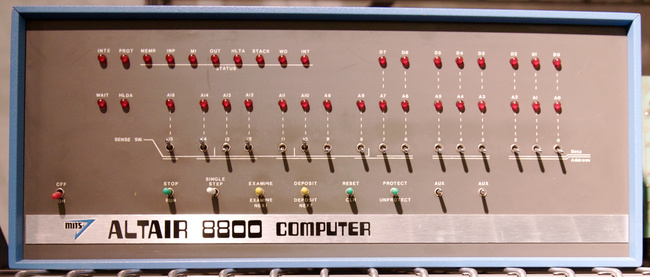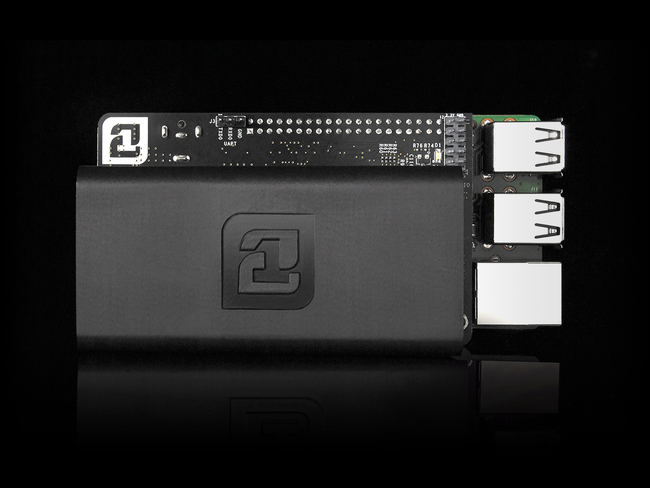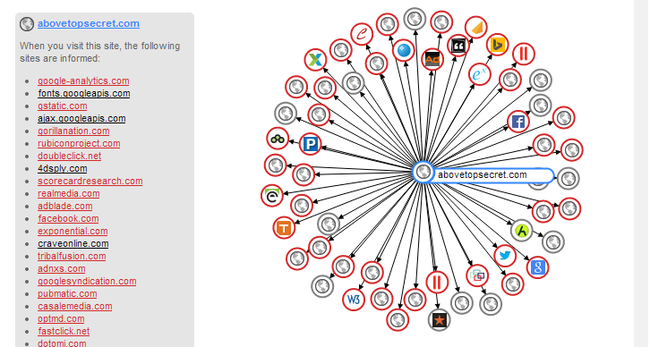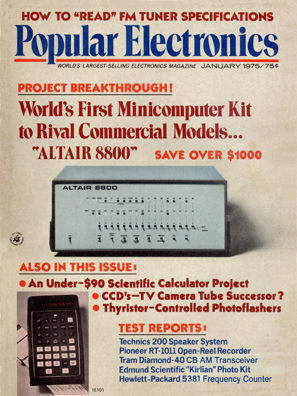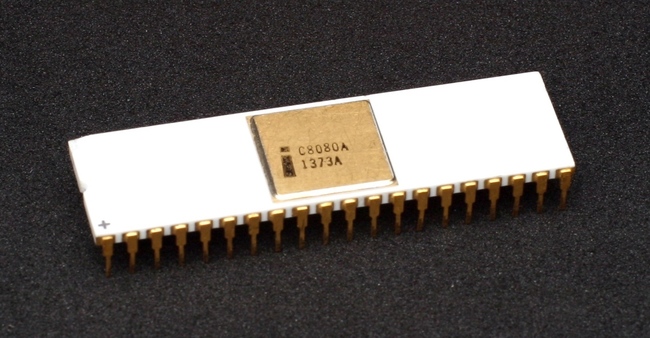The 21 Inc. Computer is the new Altair 8800
So, 21 Inc. finally unveiled their first product yesterday:
Oops, sorry, wrong photo!
It’s…. A $400 glorified Raspberry Pi with a shitty mining chip glued on top.
Meh.
Right? Well…
The real target cost is pennies, not dollars, not hundreds of dollars, certainly not $400.
The idea is to embed the new chip in smartphones, tablets, routers, everything. (Which is why Qualcomm & Cisco are involved.)
Drop the chip, embed the design in SoC’s and we’re talking single pennies.
The “computer” is not a Bitcoin miner, it’s a platform prototype.
A devkit for future devices which would have native Bitcoin support (wallets & coin-generation) for identification (private keys), and micro-transactions.
But who needs that? We all do!
Here’s why:
Advertising is the life blood of internet companies. Partly, because we lack microtransactions. Google & Facebook & Twitter are advertising companies.
There are two alternatives to advertising for media companies:
Not making money. Ouch!
Recurring subscriptions. Yuck!
Content is being indirectly monetized, through cookies, and trackers and beacons, selling your personality, preferences, interests, and the fingerprint of your soul. Your personality is then traded and shared, among the hundreds of companies which follow your digital movements. Example:
Someone, somewhere is willing to pay, to show you what they want you to see, instead of what you wanted to see. The online experience is about the needs of the advertiser instead of the guy with the eyeballs.
This adversely affects online content and presentation.
Infernal specimen, for your consideration:
Source: http://blog.placeit.net/business-models-destroy-ux-newspapers/
Yikes! Everything is free, nothing is good, you are the product.
Welcome to user experience hell. This is the internet of 2015. This is broken.
The internet runs on advertising. 21 can change that.
You see, websites need to punish you for blocking ads and disabling trackers. Failing that, their business just became a charity. Have you tried browsing without javascript, with adblock, with cookies disabled, with anti-tracking browser plug-ins?
Commercial websites flat out stop working. So you have to disable your defenses. Just allow this one tracker, and this here piece of javascript, and so on, to get the sweet content, and with that, they’re right back in.
Withhold privacy, you get punished. Say no to ads, you get punished.
But without adverts, journalists and editors starve.
So there is no alternative to war. Or… is there?
Opt in to micropayments. Opt out of tracking and ads.
Pay for content, end the war, get a clean internet experience.
And you don’t pay with cash, you pay with power.
Are you going to notice those extra watts?
Upgrade your internet experience.
With your new “21 Inside” router.
Next, link unforgeable bitcoin private keys with biometric identification.
And… *waves hands* You just killed:
- Passwords…
- sign-ups…
- e-mail confirmation…
- login screens.
And removed a ton of hassle and frustration and waste.
Give every internet user a source of fresh, unbought, newly generated Bitcoins → enable e-commerce without logins and sign-ups.
You will stop being your email and password.
You will become your private keys.
Imagine buying a digital newspaper, in cash, no questions asked.
A merchant requests payment.
A customer pays.
A product gets delivered.
This is generally impossible on the internet today,
(What is wrong with the world? Why haven’t we fixed this!?)
What we have instead are a bunch of extra steps where customers are absolutely required to have permanent “accounts”.
Want to read the newspaper? Need an account for that.
Even the most minute purchase requires paperwork.
And don’t you just love paperwork?
So all the merchants have databases containing personal data and payment credentials for everyone and keeps them safe for ever and ever. And if someone bad gets your data, they get to buy things from any merchant in your name, and then you have to pay for it.
Unless you complain to the bank, in which case the bank covers for the customer but nobody covers for the merchant, so the merchant loses the sale, and everything becomes more expensive. But this is okay with the bank because they take a cut from every sale to cover this, so everything gets even more expensive.
What we have is a situation where the bad guy is happy and the bank is happy. But merchants and customers are sad and constantly worried. So we see less commerce on the internet than we otherwise would have.
With Bitcoin, there’s no need to keep your data on file for digital payments.
And with that, we can eliminate a lot of identity theft. Yay!
(Corporate and individual victims are grateful.)
Yes, people should have your name and address on file if you buy a house.
But not if you just want to buy a book and read it. Not in a free society.
Why does every online retailer need all your personal data to sell you a digital good? Because of credit cards & identity theft. And advertising.
Imagine shopping online without revealing your name, address, phone number, birth date, your mother’s maiden name etc. etc. etc
…to any and every new retailer.
If bitcoin fuels the internet, they don’t need your personal data,
…so they shouldn’t have your personal data.
Today, every service stores all the data for every user.
And you have to trust everyone to keep everything safe all of the time.
As painful experience shows, the status quo is a recipe for disaster.
It’s a liability for everyone. And with Bitcoin, we can fix it.
Bitcoin points the way to an internet without friction between: “I want this digital good” and “I’m enjoying this digital good.” Games, books, magazines, music, livestreams, movies, journalism. Any sort of digital content.
With digital cash for digital content, we can make all online commerce like one-click shopping at Amazon.
If Bitcoin had been there when Tim Berners-Lee invented the Web,
all online commerce would be like one-click shopping at Amazon.
Visit a digital-merchant. “Click to read this article.” Done.
Better for content-producers.
Better for internet users.
And that’s why you need Bitcoin.
But bitcoin today has more friction than regular old ecommerce.
“The infrastructure isn’t quite there yet.” How fix?
Plug in your bitcoin gadget from 21 or (Cisco or Qualcomm or whatever), and your account starts filling up.
Maybe there’ll be an iPhone/Android app with a nice interface, so you can enjoy watching the numbers go up. Hell, maybe you sometimes pull out your phone to watch the numbers go up at work, or at school. (There are really nice graphs.)
And so you spend some. Perhaps you find that you don’t have quite as much as you’d like, so you go to top off your account somewhere, and you’ve just been onboarded.
And then this chip starts shipping in a few different mass-market devices, and soon those bitcoins you started earning last year are up in value, by like a lot, which is exciting, so you tell your friends, and perhaps a couple of them want one, and suddenly… chain reaction.
Back to the newfangled gadget:
It’s not a Bitcoin miner, it’s the Altair 8800 of the Bitcoin powered internet.
The Altair 8800 was nearly completely useless.
No punch-cards. No disks. No teletype. No screen.
Physical switches for input. Flashing lights for output.
A dud. A turkey. A technological dead-end.
Except it cost four hundred dollars, instead of four-hundred-thousand.
Except it used less power than a city block.
Except it had this new all-in-one chip, the microprocessor.
Which made it fit on the desk, instead of filling the room.
And then Bill Gates got one of these useless DIY computers.
And wrote Altair BASIC with Paul Allen.
And convinced people to pay for their program. (Crazy, right?)
And founded Microsoft. And people started writing programs, and selling them, and so programs turned in to… software.
By monetizing software, something strange happened where people started working really hard to make their software as good as humanly possible.
(And the world went to hell for Richard Stallman.)
But soon, normal people (without extensive training, unusually narrow interests, or extreme IQ) could use computers to actually do stuff. Like spreadsheets, and word processing, and… everything.
So, microcomputers became useful over time.
All this is to say, If you look at the 21 device as, simply, a bitcoin miner.
You could view it as almost completely useless.
It’s expensive, won’t break even, etc, etc, etc.
Yeah, maybe, okay.
And you’re missing the point entirely.
What can a microcomputer do that a nice big-iron mainframe can’t do better and faster? Nothing, or everything, depending on your point of view.
The new device is not about mining coins in bulk.
It’s not about you mining coins to sell on Bitstamp or something.
It’s a zeroth generation bitcoin native platform.
A low power bitcoin generator, full node, and bitcoin processor.
Like the first microprocessor devices, it’s an expensive and useless toy.
Give it time and it will be cheap, useful, and ubiquitous.
Perhaps, eventually, inside everything.
Bitcoin in every device, by default.
Today: Bitcoin on a chip on an expansion board on a Raspberry Pi.
Next: Bitcoin on a chip in a mass-market device.
Later on: Bitcoin-in-every-chip. (Hello, Intel & AMD.)
There was a… uhm… hard fork, where the Intel 8086 replaced the Intel 8080, and further history which we’ll happily gloss over, but, incredibly, today, some four decades later, much software is still 8086 i.e. x86 compatible. Four decades later, there are billions of x86 devices.
Most don’t look like computers, but instead like TVs and cars and cell phones and toasters and dish washers and stuff.
Maybe the 21 computer is a dud. A turkey. A dead end.
Will gadgets and software in 40 years will be x86 Bitcoin compatible?
This is clearly undecided, but it does seem to be on the table.
That whole Bitcoin powered internet we talked about earlier.
It doesn’t exist yet. It’s merely a possible future.
Won’t happen unless people roll up their sleeves and make it happen.
But if you ever dreamed of fixing the internet.
Or being the next Bill Gates, or something.
This might be your chance here now.
